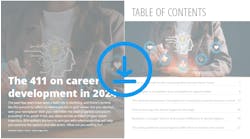By Kristine Hodsdon
One common frustration hygienists often express is that patients do not value hygiene appointments the way hygienists would like them to. Hygienists ask me questions such as, "How can I make my patients value their hygiene therapy?" Or, they will ask, "How can I make my patients understand the importance of restoring their teeth?"
Without trying to trivialize this important issue, I need to point out that we cannot make our patients understand the importance of performing self-care routines, restorative care, or anything else for that matter. We need to realize that a better question to ask is, "How can I understand how my patient processes information, so I can deliver the message in a manner that he will receive it."
OK, I'll put it another way. Why do some people see a glass as half full and others see it as half empty? Why do some professionals get stoked when attending continuing education programs and others have to be dragged into a program, kicking and screaming? The difference is how a person processes, deletes, sorts, and gathers messages and information they are exposed to every day.
Tony Robbins, a motivational life coach, dubs this technology as metaprograms. Metaprograms operate in our brain just like computers do on our desks. Computer software creates massive amounts of files that we can use, retrieve, or never open again. Our brain structures how we understand, use, attach meaning, focus, etc., during our daily experiences, organizing our thinking process.
If you understand that all human behavior revolves around the urge to gain pleasure or avoid pain, then the metaprogram involving the concept of moving toward something or moving away may assist you in successful communication with patients. A married couple, Mr. and Mrs. Jones, serves as an example. They arrive together for their three-month hygiene visits. Mrs. Jones is motivated by a beautiful smile. Being able to chew motivates Mr. Jones. Mrs. Jones visits the hair stylist and gets regular manicures. Mr. Jones visits the local barber, has his car tuned up every 3,000 miles, and rotates his tires every (well, I do not know how often; I can barely replace windshield washer fluid). Anyway, the point is that their appearance and style — although both clean and neat — are different. After spending time listening to the pleasant and conversational couple, one realizes their values and beliefs are different.
Now let's return to the previous premise that we cannot "make" our patients value hygiene. What if you said to Mrs. Jones, "I highly recommend that you schedule an appointment with me again in three months so we can maintain your periodontal health to ward off any future problems." Would that sentence compel her to schedule and keep her appointment? Maybe, maybe not. But consider saying, "Mrs. Jones, I know you enjoy drinking your Starbuck's coffee, so I highly recommend that we schedule you in three months so we can maintain your sparkling smile." Would she respond differently to that suggestion.
Absolutely. Why? With choosing to focus your words based on how the patient processes information (a self-appreciation of appearance), she is likely moving towards a "brilliant smile." Mr. Jones is most likely trying to move away from unforeseen pain — unhealthy or unplanned dental surprises. These two distinctions can be key in presenting the value of hygiene.
Another metaprogram that dovetails this nicely is possibility versus necessity. Opportunities and new advances motivate people who are driven by possibilities. What's known, controlled, or even secure can motivate people who are driven by necessity.
Let's examine Mr. and Mrs. Jones again. What drives Mr. Jones? Necessity or possibility? Arguably, there are no absolutes in human behavior. But, with Mr. Jones, I would place my money on necessity.
Do you think you can talk about maxillary veneers with Mr. Jones? Or is Mrs. Jones more likely a candidate for the wonders of smile design? Both are, if you can individualize and emphasize different outcomes in your verbal communication.
"Mr. Jones, you have some broken-down fillings in the front, top teeth. They are wearing and you mentioned that when you floss, the floss is getting stuck. Dr. Smile can provide you with conservative and predicable veneers that will re-strengthen and protect your teeth. Does that treatment work for you?" Most likely, you now have Mr. Jones' attention. However, with the same key words, Mrs. Jones would take a nap in your chair.
With her, consider a different approach. "Mrs. Jones, you have some broken-down fillings in the front, top teeth. They are wearing and you mentioned that when you floss, the floss is getting stuck. Dr. Smile can re-dazzle your upper front teeth to make them look like a Hollywood star. Does that treatment work for you?"
The reality is that the proverbial Mr. and Mrs. Jones — no matter how you phrase their treatment options — may not show up for their next hygiene appointment. It could simply be they want to be somewhere else. Sometimes, a sunny day on the beach sounds more appealing than a dental appointment, or even the more serious disruptions such as a last-minute business meeting or a sick child. Some patients have legitimate reasons that we should accept.
And, sometimes, we have to consider that our communication styles or word choices are a mismatch. These two metaprograms (and there are more; Robbins' book is titled, Unlimited Power) are tools to help you make distinctions in your words and approaches to your patients.
Kristine A. Hodsdon, RDH, BS, is an international speaker, author, and software developer. She is the author of Demystifying Smiles: Strategies for the Dental Team. The book is available online at www.pennwell-store.com. She can be contacted about speaking or coaching at [email protected]. Visit her on the Web at www.hygienemastery.com.





